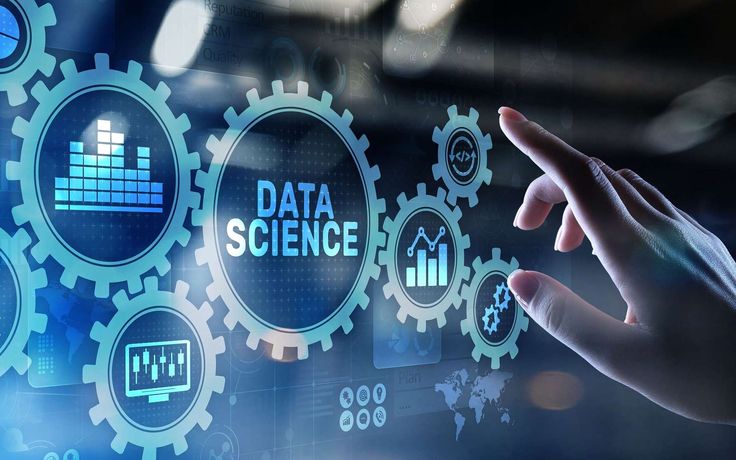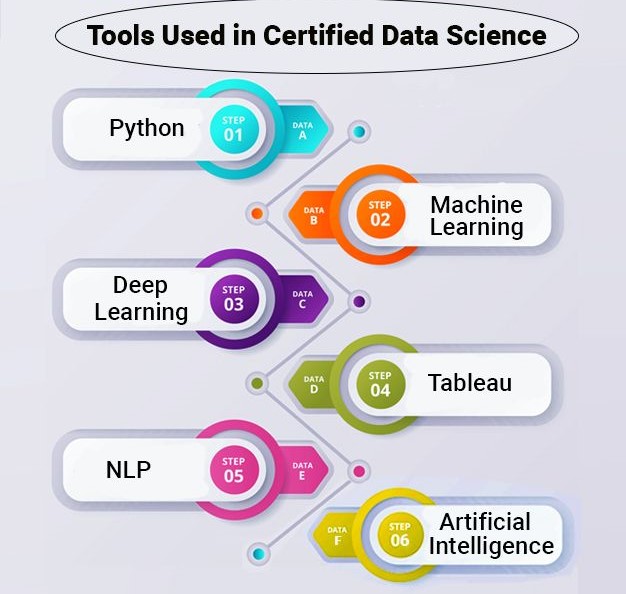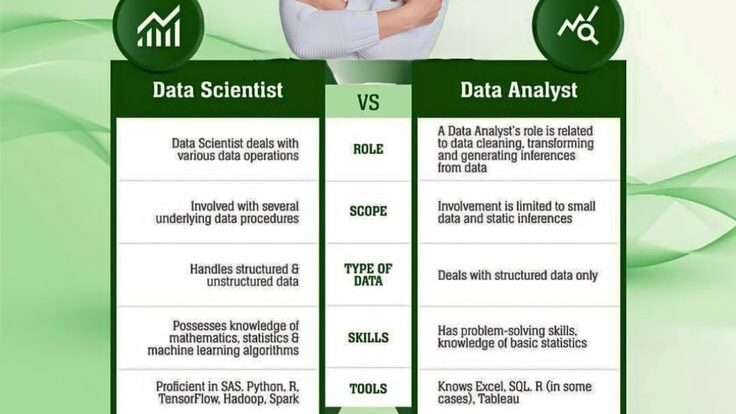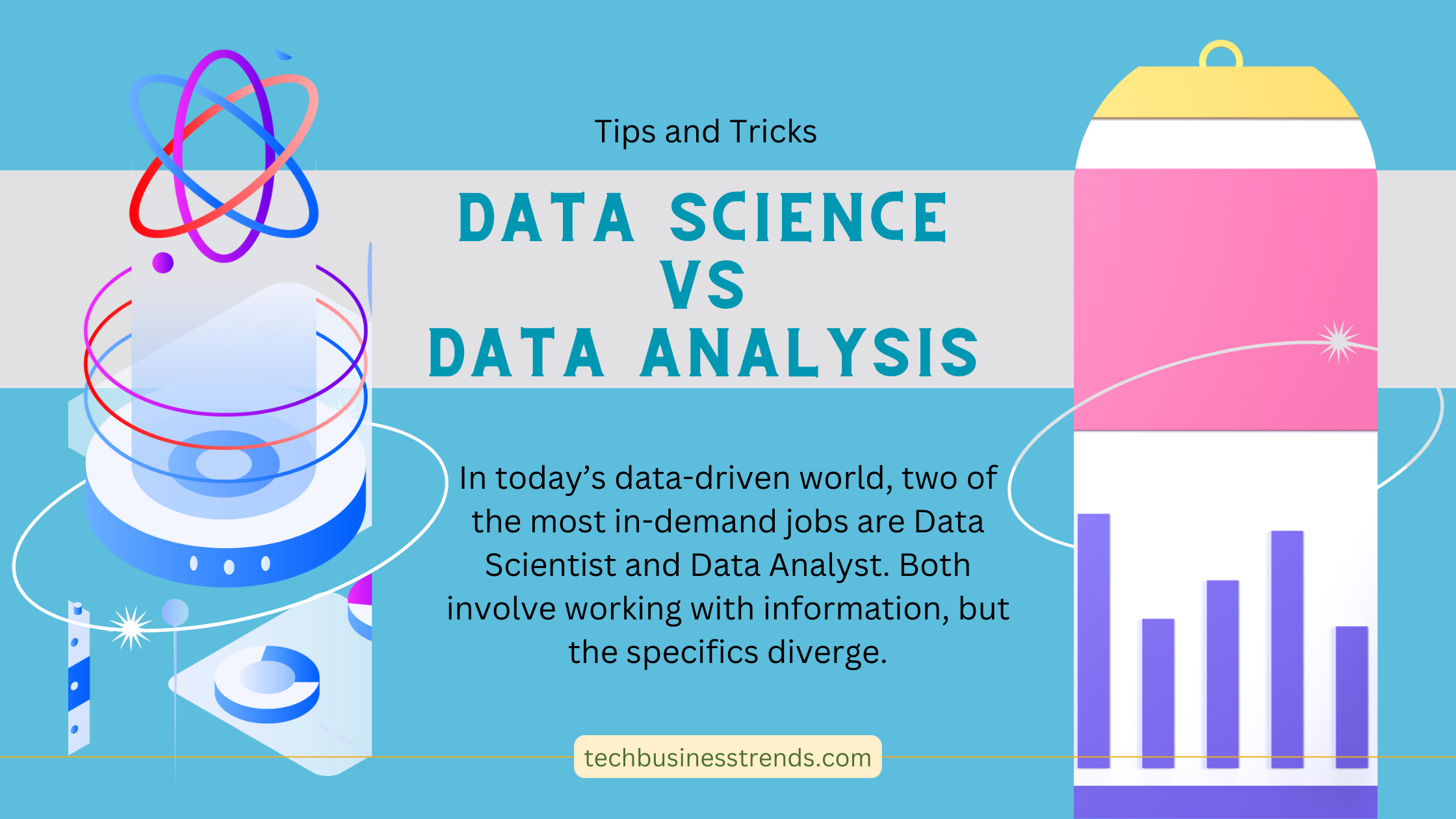In today’s data-driven world, two of the most in-demand jobs are Data Scientist and Data Analyst. Both involve working with information, but the specifics diverge.
This article will shed light on the key differences between these two exciting fields, helping you pick the perfect path for your professional journey.
Data Analytics
Data analysts, the unsung heroes of the data revolution, play a key role in turning unstructured data into actionable insights. They are conduits for information and decision-making, identifying patterns and hidden features that move businesses forward.

What does a Data Analyst do?
The day-to-day tasks of a data analyst can be broadly broken down into three main areas:
- Data contention: Involves gathering information from various sources and ensuring its accuracy and completeness. Imagine a data analyst carefully organizing a cluttered upstairs room, dumping clutter and organizing valuables.
- Data analysis: Once the data is prepared, the analyst puts on his detective hat. Statistical methods and data visualization tools are used to identify patterns, trends, and relationships in data. This can be anything from analyzing customer purchase history to measuring social media sentiment.
- Communication: Comment: Data analysts aren’t just number crunchers; They are storytellers. Complex data findings are translated into clear and concise reports and presentations that even non-technical audiences can understand.
Skills of a Data Analyst
- Analytical Thinking: An eye for detail and the ability to interpret and draw logical conclusions are essential.
- Database skills: The ability to query and apply SQL to data is a must-have skill.
- Data Visualization: Creating clear and compelling charts, graphs, and dashboards is key to effectively communicating insights.
- Business intelligence: Understanding the industry and its complexities enables researchers to tailor findings to actionable business decisions.

Data Science
Data scientists, the modern-day alchemists, own the precise potential to convert records into effective equipment for destiny. They delve deeper than statistics analysts, venturing into the world of complex algorithms and modern technologies to release the hidden potential inside information.

What does a Data Scientist do?
Unlike records analysts who are aware of extracting insights from current records, information scientists are the architects of destiny. Here’s a glimpse into their international:
- Model Building: Data scientists construct state-of-the-art fashions and algorithms the usage of device studying and artificial intelligence. These models can expect destiny developments, automate responsibilities, or even generate creative content.
Imagine a records scientist crafting a recipe that magically transforms uncooked statistics into predictive insights.
- Statistical Mastery: Statistical analysis is the bedrock of facts science. Data scientists leverage statistical strategies to create strong fashions and make certain their accuracy.
- Programming Prowess: Languages like Python and R are the tools of the change. Data scientists wield those languages to manipulate information, construct fashions, and automate tasks.
- Problem-solving Ingenuity: Data technological know-how isn’t always for the faint of heart. Data scientists tackle complicated challenges, constantly innovating and experimenting to discover the fine solutions.
Skills of a Data Scientist

- Machine Learning Expertise: Understanding and making use of machine learning algorithms is fundamental for constructing intelligent models.
- Statistical Strength: A strong foundation in facts and chance is important for creating dependable and powerful models.
- Programming Proficiency: Advanced programming skills in languages like Python and R are vital for statistics manipulation and model building.
- Problem-Solving Aptitude: The ability to method demanding situations creatively and analytically is key to growing innovative solutions.
Data Analytics vs Data Science
| Feature | Data Scientist | Data Analyst |
| Focus | Building models and algorithms for future predictions | Answering specific business questions through data analysis |
| Technical Skills | Python, R, Statistics, Machine Learning | SQL, Data Visualization Tools |
| Problem-Solving Approach | Experimentation, Innovation | Interpretation, Established Techniques |
| Communication Style | Model-building focused, May not emphasize technical details for non-technical audiences | Translator, Explains complex findings in clear narratives |
| Analogy | Architect (uses data map to design for the future) | Explorer (maps the data landscape) |

So, Which Path Should You Choose?
Are you detail-oriented with a knack for storytelling? A profession as a data analyst might be your calling. You’ll enjoy the system of remodeling information into actionable insights that drive enterprise decisions.
Do you crave challenges and take pleasure in the possibility of constructing destiny? Data technology might be your best in shape. You’ll be at the forefront of innovation, leveraging current equipment to clear up issues and predict destiny developments.
The Final Verdict
Both science and analytics offer exciting opportunities in today’s data-driven landscape. The best choice depends on your own strengths and interests. Consider your comfort level with technical aspects, networking interests, and long-term career goals.
Ready to take the next step? Research online courses, search for appropriate credentials, and connect with professionals. With dedication and the right skills, you can carve out your niche in the ever-changing world of data.
Conclusions
Data science vs data analytics is complementary, collaborative disciplines to extract knowledge from data. Whichever you choose, you will be part of a dynamic and ever-evolving industry with tremendous potential to impact industries.
FAQs
Q: What career path pays the most?
Data science positions generally have higher salaries due to the specific skills required. However, compensation may vary depending on experience, location and industry.
Q: Can I convert from data analyst to data scientist?
Definitely! Many data scientists started their careers as data analysts. Building your programming skills and taking the right classes can pave the way for this change.
Q: I don’t have a strong technical background. Can I still work in data analytics?
Yes! There are data analyst roles that focus on business intelligence that require little technical knowledge. Additionally, many online courses and boot camps can provide you with the necessary skills to enter the field.
